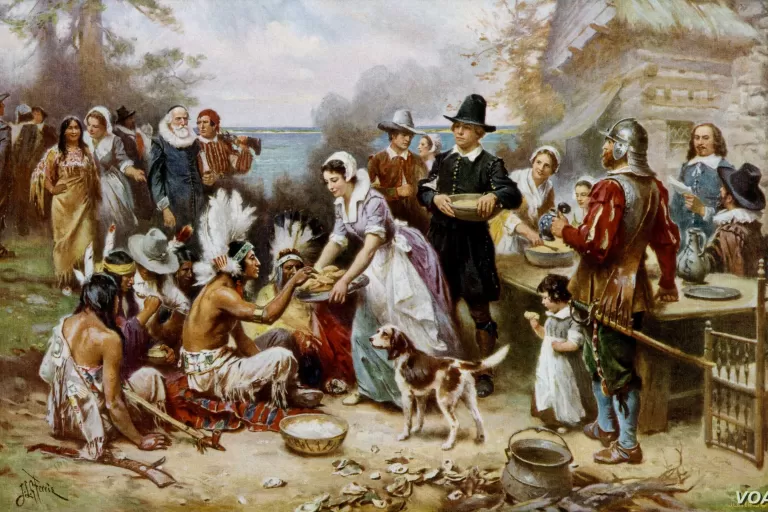
November the 21st, 1621, Plymouth, New England: The pilgrims sat down to feast with 90 of their Indian brethren. Governor William Bradford offered the following prayer:
“Lord God, Thy hand has watchfully brought us to this land and given us friendship with the natives that live herein. We do give solemn thanks and praises to thy name.”
You know, that these stalwart souls were of a mind to offer such thanks is the story I want to tell you this Thanksgiving.
The pilgrims began as separatists from the Church of England. They wanted freedom to worship as they chose. And because of that, they were branded as traitors by the crown and persecuted, sometimes even unto death. And then, moved by the Spirit of God, they set their eyes on the newly discovered land of America. On September 6, 1620 the Mayflower set out with 102 passengers crammed in every inch of space. Consider it: Those pilgrims left all, and they would never return.
Well, the voyage was difficult, fraught with much suffering, sickness, and even death. As the season advanced, the North Atlantic weather grew colder. Food and water became scarce, and it seemed as though that journey would never end. Finally, after 66 days land was sighted at dawn on November the 19th. They dropped to their knees and thanked God.
One of them wrote though, “We now had no friends to welcome us, nor inns to entertain or refresh our weather-beaten bodies – no houses, or much less, towns to seek help.” And then she added, “And it was freezing cold weather.” But they were grateful. Why?
On Christmas day, 1620, they began construction on a common storehouse. But without homes and adequate food, they could never get warm. They weakened and became ill. When they finished the storehouse, it became a hospital.
Disease took its toll on them, and as many as two or three settlers died every day. At one time, there were only 6 healthy people out of more than a hundred who could care for the sick. This was called by them ever after “The Starving Time.” Only 51 pilgrims survived that first winter out of 102. Scarcely a family was not hit. Still, after all that, they gathered every day twice daily and offered prayers of thanks.
And you know, when the Mayflower returned to England in the spring, it is a testimony of the value of freedom to note that not one pilgrim went with her in spite of it all.
And then the Indians – they had feared them. But when the Indians finally came, they came friendly and with a desire to help, which if you consider how the Indians had already been treated by the whites, it was a miracle that they were friendly. The kindness of those early Native Americans saved those pilgrims.
Through the summer the pilgrims worked, and hard with little comfort. And when fall came, their harvest was plentiful; they wanted for nothing.
And so filled with the spirit of gratitude, Governor Bradford proclaimed a feast, and then added, “We will extend an invitation to our Indian friends to join us in the feasting.”
And on the day of the feast, Massasoit arrived with 90 Indians. For three days they prayed, sang, feasted, played, and bonded as brethren in the family of God.
Now my friends, why [was there] a feast of Thanksgiving? What did they have to be grateful for? Well, they had a greater faith in God, they had freedom, and now they had food, shelter, and friends. And when you think about it, what else matters?
Their gratitude for simple things changed the lives of millions all the way to your table. Happy Thanksgiving.
Story Credits
Glenn Rawson – November 2003
Music: The First Thanksgiving – Deanne Casperson
Song: America Bound – Mayflower Chorus

